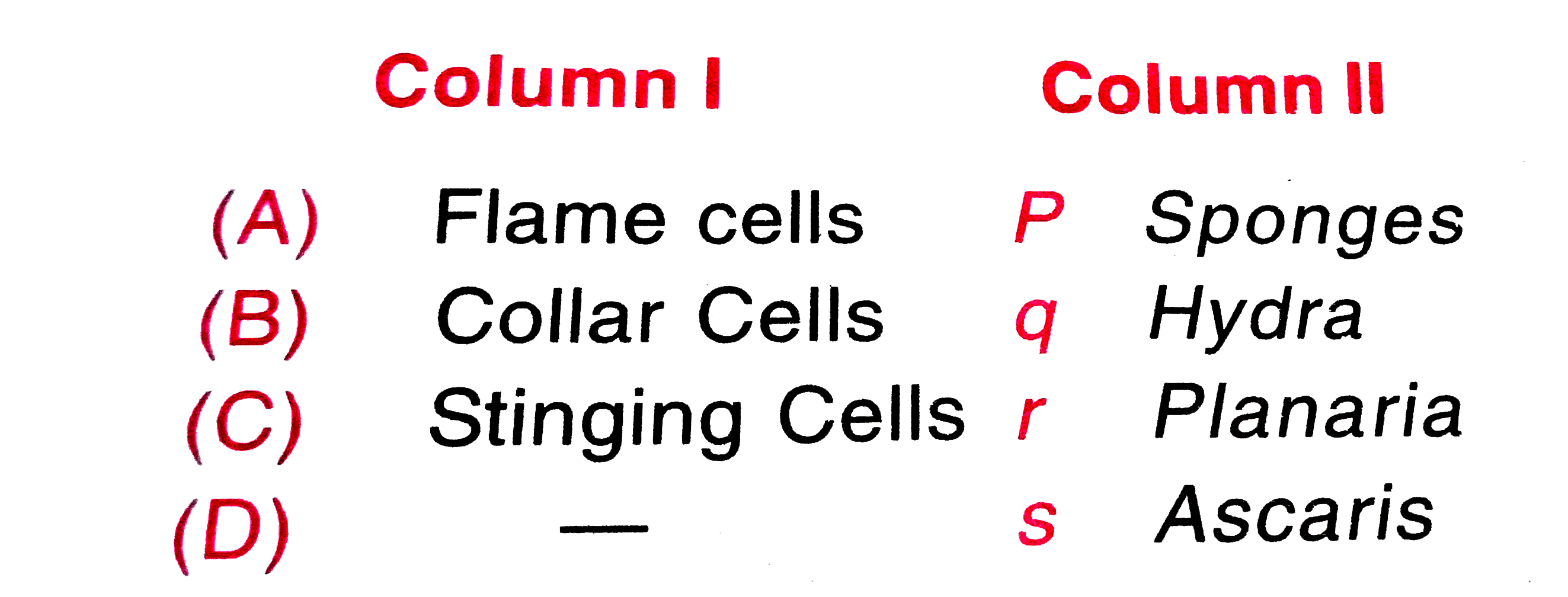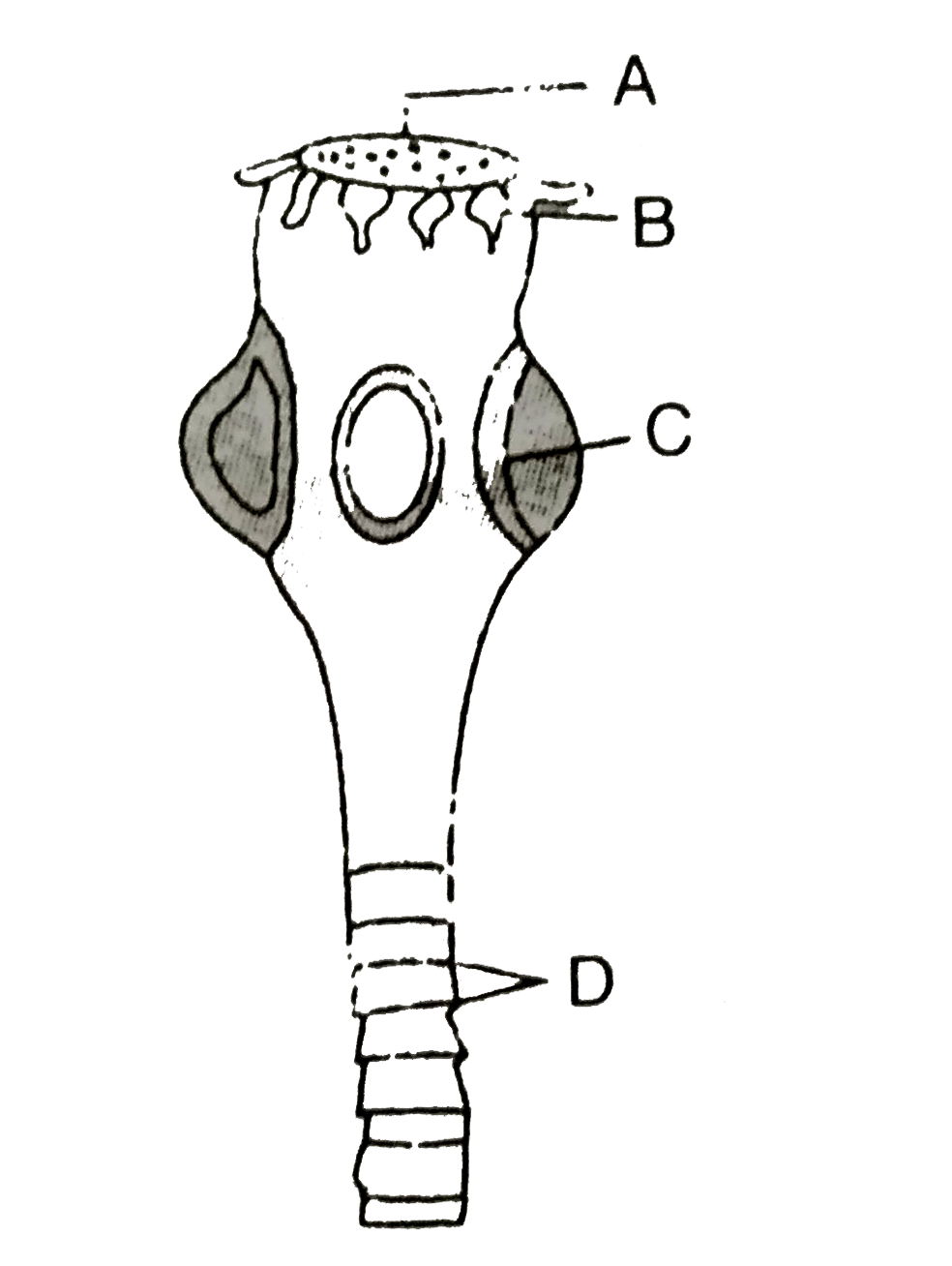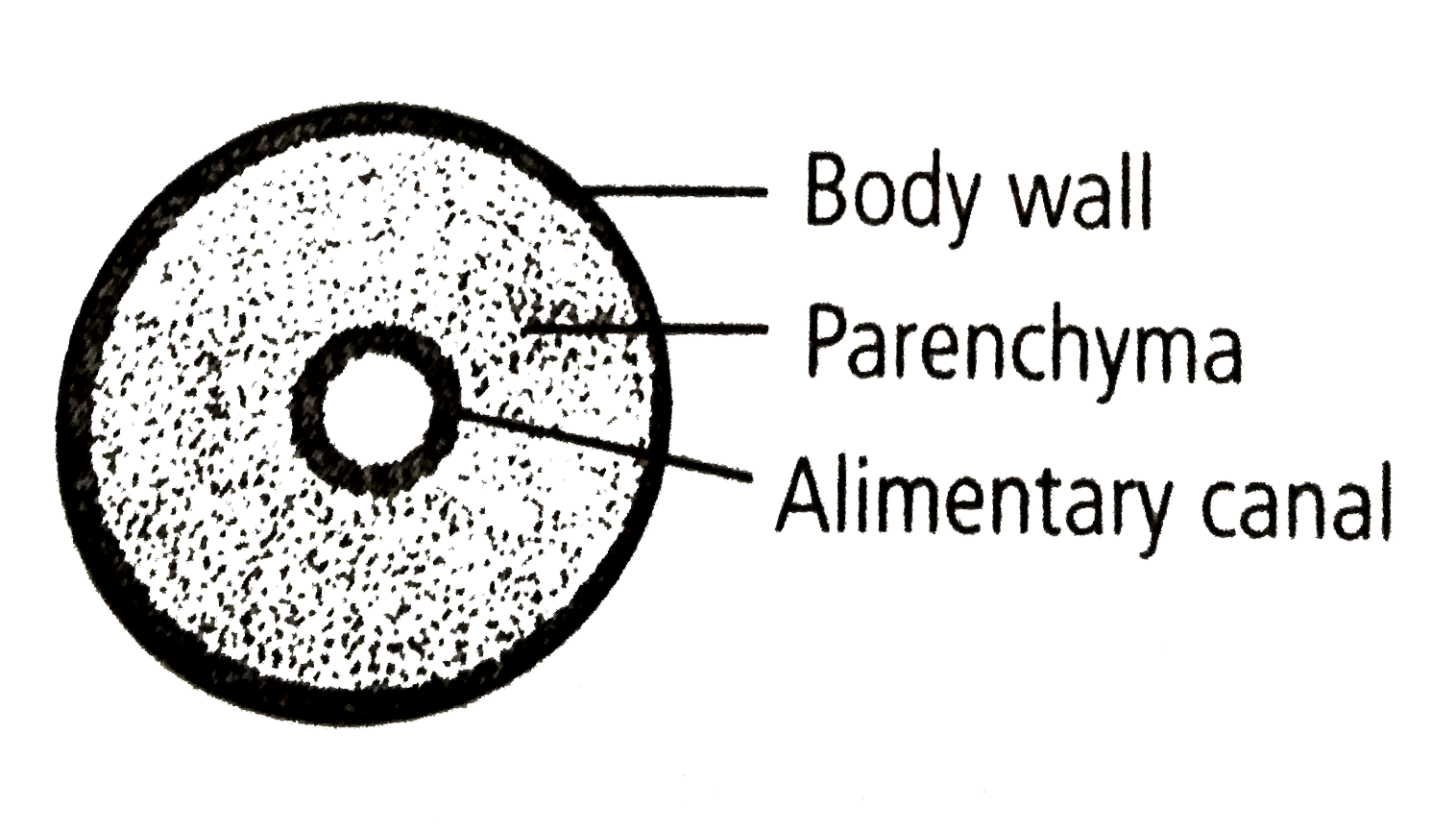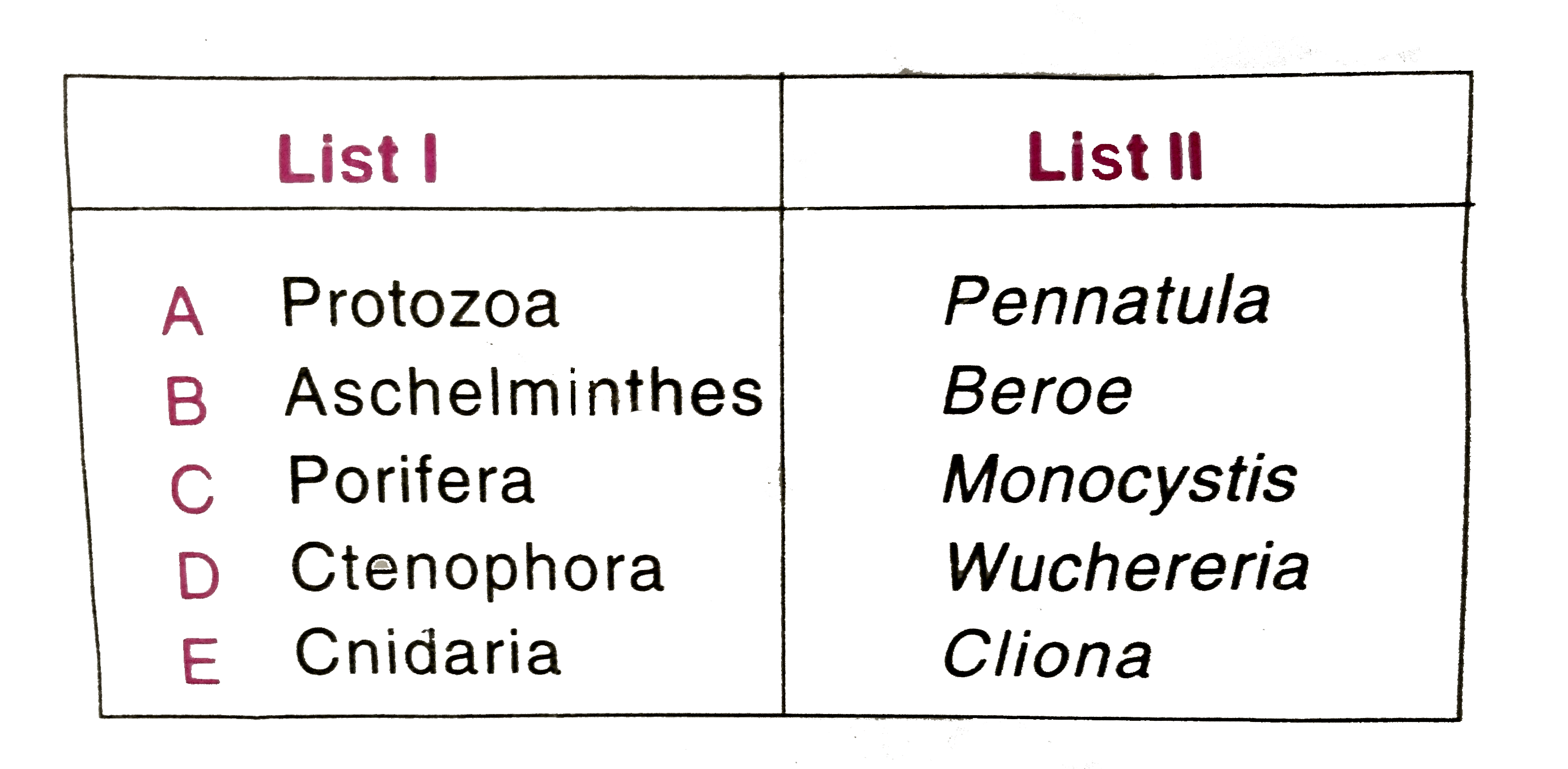Complete Solutions to MCQ of chapter ANIMAL KINGDOM -NONCHORDATES of Class 12 book with complete answers and questions
| Class 12 | BIOLOGY |
| Chapter | ANIMAL KINGDOM -NONCHORDATES |
| TRUEMAN BIOLOGY | MCQ |
| Number Of Questions | 100 |
| Academic Year | 2023-24 |
Sponges are not found in
View SolutionCharacterisitic feature of sponge is the occurrence of
View SolutionIn sponges digestion takes place in
View SolutionWater current through the body of spongs is maintained by
View SolutionClassification of Phylum Porifera is based on
View SolutionSponges have divison of labour, which cells are found in gemmules for asexual reproduction?
View SolutionEpidermis of a sponge is called
View SolutionEndoskeleton of sponge is called
View SolutionOstium and osculum are sorrounded by
View SolutionThe larva of Sycon is
View SolutionRhagon type of larva is found in
View SolutionThe phenomenon of regeneration in sponges was observed and explained by
View SolutionAssertion(A): In sponges, archaeocytes are totipotent.
Reason( R): They give rise to all types of amoebocytes and are self replicating.
View SolutionA distinguishing feature of cnidarians is the presence of
View SolutionNutritionally Hydra is
View SolutionHydra can digest all types of food except
View SolutionWhich of the following tissues is absent in Hydra?
View SolutionAssociation of Zoochlorella and Hydra is the example of
View SolutionInterstital cells renew
View SolutionWho first discovered the regenerative ability of Hydra?
View SolutionNematocyst is
View SolutionHypnotoxin is a poisonous fluid produced by
View SolutionHydra can be
View SolutionPortuguese Man of War is
View SolutionMetagenesis is found in
View SolutionPneumatophore is present in
View SolutionCoral island is in
View SolutionIn Hydra
View SolutionThe characteristic larva of phylum coelenterata is
View SolutionWhich one is mismatched ?
View SolutionFind the odd example
View SolutionDigestion in Hydra is
View SolutionPrimitive nervous system is formed in
View SolutionDigestive tract in ctenophores is
View SolutionPaedogenesis is observed in
View SolutionCleavage in ctenophores is
View SolutionDuring development of ctenophores there is a ciliated spherical larve which is called
View SolutionComb plates are found in
View SolutionBioluminescence is well marked in
View SolutionBiradial symmetry is found in
View SolutionWhich animal would not survive, if there were no ponds of water?
View SolutionAlimentary canal is not found in
View SolutionFood is sucked in by Fascioda hepatica with the help of
View SolutionAnus is absent in
View SolutionParasitic animals have well-developed
View SolutionThe intermediate host in the life-cycle of liver fluke is
View SolutionCopulation in Taenia occurs between
View SolutionThe seat of proliferation with fertilised eggs in the uterus of tapeworm are regularly detached. This is known as
View SolutionThe matured proglottides with fertilised eggs in the uterus of tapeworm are reguarly detached. This is known as
View SolutionT.solium passes on to secondary (intermediate) host at which stage?
View SolutionBladderworm (cysticercus) is the larva of
View SolutionWhen cysticerci are present in the muscles of pig it is called
View SolutionThe following are found in Taenia solium. Which one is the correct sequence?
View SolutionGive the correct match in the following

View SolutionDuring its life cycle fasciola heptica (Liver fluke) Infects its intermadiate host and primary host at the following larval stages respectively
View SolutionIn contrast to Annelids, the Platyhelminthes show
(a) Radial symmetry
(b) Presence of pesudocoel
(c) Bilateral symmetry
(d) Absence of body cavity
View SolutionIn the given diagram, different parts are indicated by alphabets. Choose the answer, in which these alphabets correctly match with the parts they indicte.

View SolutionThe given figures shown a cross section of the body of an invertebrate. Identify the animal which has such body plan.

View SolutionOrgans of excretion and osmoregulation in Platyhelminthes are
View SolutionWhich one of the following animals possesses high regeneration capacity?
View SolutionOne example of animals having a single opening to the outside that serves both as mouth as well as anus is
View SolutionRoundworms differ from flatworms in having a
View SolutionPhasmids of Ascaris are
View SolutionMale Ascaris can be differentiated from female Ascaris by
View SolutionThe lips of Ascaris are
View SolutionCuticle of Ascaris in noncellular and beneath the cuticle in Ascaris lies a thin epiderms having scattered nuclei and no separate cells, this epidermis is
View SolutionExcretory structures in adult Ascaris are
View SolutionMoulting of Second instar larva of Ascaris occurs in
View SolutionEggs containing the second state juvenile are
View SolutionThe final moult of the rhabditiform larva of Ascaris occurs in human
View SolutionSecond stage larva of liver fluke goes on three week typical wandering tour. The course of travel is as follows,
View SolutionCleavage in the egg of Ascaris is
View SolutionWhich larval stage of Ascaris is infective?
View SolutionLife span of Ascaris is
View SolutionWhich of the following sense organs is present in Ascaris are chemoreceptors and located in anterior part?
View SolutionCyclope is intermediate host of
View SolutionOil of Chenopodium and drug named Alcopar are used in
View SolutionFilariasis is caused by
View SolutionThe technical name of guineaworm is
View SolutionAscaris is
View SolutionWhich of the following is an unsegmented and viviparous worm?
View SolutionThe common name of Ancylostoma is
View SolutionFilarial larvae are found in man's (host)
View SolutionSwelling of legs and scrotum occurs due to
View SolutionWhich of the following parts of the human body is least affected by filariasis?
View SolutionAdult worms of Wuchereria are found in human
View SolutionAncylostoma causes
View SolutionMicrofilaries are carried by
View SolutionWuchereria causes a disease in which parts of India
View SolutionIn India, filariasis is transmitted by
View SolutionIn Ascaris 3rd moulting takes place in
View SolutionDifferentiating trait of Ascaria is
View SolutionSites of first, second and third moulting of Ascaris larva are
View SolutionWhich of the following penetrates through skin and enters the intestine
View SolutionThe dioecious animal is
View SolutionAscaris is characterized by the
View SolutionThe parasite which completes its life cycle in a single host is
View SolutionMatch the List I with List II and select the correct option.

View SolutionWhat is the common between earthworm, leech and centipede?
View SolutionTrochophore larvais present in the development of
View Solution
MCQ questions and complete solutions for chapter ANIMAL KINGDOM -NONCHORDATES of TRUEMAN'S BIOLOGY (ENGLISH) of Class 12